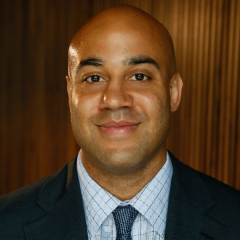If you think that campaign ads for the Nov. 6 midterm election have gotten out of hand when it comes to bending the truth, you’re probably right.
Lying is perfectly acceptable in a political campaign; in fact, it's protected. That was affirmed by a 2012 United States Supreme Court decision called United States v. Alvarez that essentially states that intentional lies are protected by the First Amendment.
But is it morally right? And does the electorate have the power to change this?
The answer is less obvious than it may seem, according to Joshua Sellers, an associate professor at Arizona State University’s Sandra Day O’Connor College of Law, whose principle areas of research and teaching include election law, legislation and constitutional law.
Sellers recently published an essay called “Legislating Against Lying in Campaigns and Elections.”
ASU Now spoke with Sellers about the upcoming midterm election and the role that lying plays in campaigning.
Joshua Sellers
Question: What inspired you to write this paper?
Answer: This was part of a symposium put on at the University of Oklahoma College of Law back in February on the topic of “Falsehoods, Fake News and the First Amendment.” It was a day of panels on lying and the First Amendment. I was on a panel with two other professors, one of whom is one of my colleagues here, Jim Weinstein. Our panel was on the First Amendment and election lies.
I anticipated that throughout the day, and particularly on my panel, there might be a lot of discussion about how lies are protected, because I knew most people would be familiar with the Alvarez case, so I thought I’d try to figure out where the line might be between the permissible and the impermissible. In general, I think everybody who works in this field knows that lies are probably protected these days. It’s hard to come up with government regulations that will survive a First Amendment challenge.
Q: Lying — or stretching the truth — seems to be a tradition in political campaigns. Since it is so common, is there really a need to try to curb this?
A: It’s true that lying in politics is as old as the republic. What concerns so many people at the moment is 1) the normalization of the lying, 2) the unabashed and incessant lying coming from the president and White House officials, and 3) changes in technology. The degree to which lies are disseminated today, most commonly by way of social media, has heightened the problem.
Q: I was surprised to learn that in United States vs. Alvarez, six justices supported the conclusion that intentional lies are protected under the First Amendment. Given that, how can someone legislate against lying in future elections and campaigns?
A: It is extraordinarily difficult to do so. I describe in the piece what I believe to be three very limited possibilities, which are doctrinally defensible. The first is when foreign nationals, during a campaign or election, engage in intentionally false speech expressly advocating for or against the election of a candidate. The second is when intentionally false speech is used to undermine election administration. And the third is when a campaign or outside political group intentionally falsifies a mandatory disclosure filing. Aside from quite limited circumstances such as these, it is exceptionally difficult to craft novel campaign and election speech restrictions that can survive a First Amendment challenge.
Q: Political rhetoric and misinformation seems to be inspiring more violence in the United States. From a free-speech standpoint, are there any realistic legal remedies for combating conspiracy websites, hate groups and other peddlers of misinformation?
A: As a nation, we are deeply committed to free speech, so to your question, there are not many realistic or desirable censorship options. That said, given their influence, I support efforts by Facebook, Twitter, etc. to prevent the use of their platforms for the dissemination of hate speech or speech likely to incite violence.
Top photo illustration courtesy of Pixabay
More Law, journalism and politics

ASU launches nonpartisan Institute of Politics to inspire future public service leaders
Former Republican presidential nominee and Arizona native Barry Goldwater once wrote, "We have forgotten that a society progresses only to the extent that it produces leaders that are capable of…

Annual John P. Frank Memorial Lecture enters its 26th year
Dahlia Lithwick, an MSNBC analyst and senior legal correspondent at Slate, is the featured speaker at the School of Social Transformation’s 26th annual John P. Frank Memorial Lecture on…

The politics behind picking a romantic partner
A new study reveals the role that politics play when picking out a romantic partner — particularly for older adults.“Findings show that politics are highly salient in partner selection across gender…

